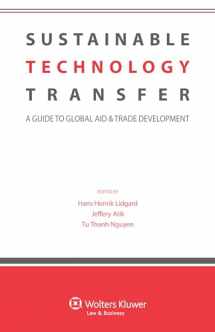
Sustainable Technology Transfer: A Guide to Global Aid & Trade Development
ISBN-13:
9789041134486
ISBN-10:
9041134484
Author:
Jeffery Atik, Tu Thanh Nguyen, Hans Henrik Lidgard, Jeffrey Atik
Publication date:
2012
Publisher:
Kluwer Law International
Format:
Hardcover
333 pages
Category:
Military
,
Law Specialties
FREE US shipping
Book details
ISBN-13:
9789041134486
ISBN-10:
9041134484
Author:
Jeffery Atik, Tu Thanh Nguyen, Hans Henrik Lidgard, Jeffrey Atik
Publication date:
2012
Publisher:
Kluwer Law International
Format:
Hardcover
333 pages
Category:
Military
,
Law Specialties
Summary
Sustainable Technology Transfer: A Guide to Global Aid & Trade Development (ISBN-13: 9789041134486 and ISBN-10: 9041134484), written by authors
Jeffery Atik, Tu Thanh Nguyen, Hans Henrik Lidgard, Jeffrey Atik, was published by Kluwer Law International in 2012.
With an overall rating of 3.5 stars, it's a notable title among other
Military
(Law Specialties) books. You can easily purchase or rent Sustainable Technology Transfer: A Guide to Global Aid & Trade Development (Hardcover) from BooksRun,
along with many other new and used
Military
books
and textbooks.
And, if you're looking to sell your copy, our current buyback offer is $0.3.
Description
There are more than eighty international agreements and many additional programmes dealing with technology transfer. Moreover, several international conventions require that aid programs, both to address acute emergencies and to assist in the longer-term building of viable infrastructures, be undertaken in specific and concrete ways. However, problems inevitably arise when good intentions are put to the test, particularly in connection with rights to the ownership of intellectual property assets. Some even claim that it is only when IPRs are respected that sustainable support can be expected. To examine the existing status of international law in this important area--and to offer recommendations for potential improvements and solutions--the Faculty of Law of Lund University hosted a conference in Vietnam in October 2010 on the subject of sustainable technology transfer from developed countries to developing countries. Focusing on the legal problems which sustainable technology transfer may give rise to and how they may be addressed--and with emphasis on health, environment, energy, and climate change--this book summarizes the most important findings of that conference. Twelve penetrating essays by fourteen distinguished European, American, and Asian legal scholars address the questions of what is required to satisfy existing international obligations and to what extent developing countries may use flexibilities in international conventions to advance their own development. The essays are concerned with such issues and topics as the following: the major institutions and players in the formulation and enforcement of rules affecting technology transfer; the real-world value of legislative enactments in the area;a factual account of actual technology transfers;to what extent competition rules offer developing countries a way to escape the more severe consequences of undertakings they have accepted;the impact of compulsory licensing;the potential effect of the Anti-Counterfeiting Trade Agreement of 2010 (ACTA); and specific conditions pertaining to conservation of biodiversity, climate change and energy. Included are thorough analyses of the obligations and flexibilities expressed in numerous international conventions--including the TRIPS Agreement, the Convention on Biological Diversity, and the UN Framework Convention on Climate Change--as well as how these obligations and flexibilities function in practice. The book concludes with a view from a developing country perspective and forward looking statements issuing from a heightened awareness of the role that technology transfer might play, if properly deployed, in the development of the disadvantaged countries of the world. Although few will argue with the Millennium Development Declaration's affirmation that those who benefit least deserve help from those who benefit most, disagreement continues over crucial details such as how technology transfer should take place and the role of the law in facilitating it. This book goes a long way toward removing persistent obstacles that block the goal of closing the technology gap, and as such it will be welcomed and studied by interested parties worldwide.


We would LOVE it if you could help us and other readers by reviewing the book
Book review

Congratulations! We have received your book review.
{user}
{createdAt}
by {truncated_author}


